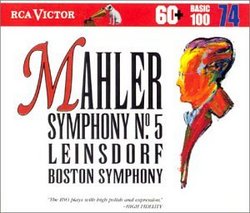| All Artists: Mahler, Leinsdorf, Boston Symphony Orchestra Title: RCA Victor Basic 100, Volume 74 - Mahler: Symphony No. 5 Members Wishing: 0 Total Copies: 0 Label: RCA Release Date: 11/7/1995 Genre: Classical Style: Symphonies Number of Discs: 1 SwapaCD Credits: 1 UPC: 090266836529 |
Search - Mahler, Leinsdorf, Boston Symphony Orchestra :: RCA Victor Basic 100, Volume 74 - Mahler: Symphony No. 5
 | Mahler, Leinsdorf, Boston Symphony Orchestra RCA Victor Basic 100, Volume 74 - Mahler: Symphony No. 5 Genre: Classical
|
Larger Image |
CD DetailsSimilar CDs
|
CD ReviewsTHE MARCH TO TRIUMPH CAPTURED demien | U.S.A. | 08/02/2000 (5 out of 5 stars) "My ears have had the delight of hearing a version of Mahlers 5th that works. This orchestra was at the top of its game and Maestro Leinsdorf was in a mood to make some magic. Maestro Leinsdorf brings out the tragedy and intensity of the first movement to the forefront meanwhile sustaining a tempo that doesn't drag. You are at the march to the cemetary and the feelings that go along with the experience are intact. The second movement begins with a vicious rage and MAESTRO Leinsdorf never lets the momentum fall flat. The fury and despair of this movement are a perfect marriage in Leinsdorfs hands. The scherzo is performed with spirit and inspiration. You are placed in this world of carnival where the lights gleam and the clowns dance to this infectious melody. A grand time is presented to all. The famous adagietto for strings and harp is not dreamy like Karajans but is extremely romantic with the strings providing a lot of portamento(vibrato/feeling) culminating in a compelling display of emotion. The rondo finale is the joy of victory displayed thru music and the BOSTON ensemble provides all of the glorious fireworks with playing that resembles the methodic roar of a freight train. This interpretation really works and with the Boston orchestra providing the goods...you can't go wrong. Go for it!" A Classic Mahler 5th James Stephen Wasvary | Valley Cottage, NY United States | 04/16/2003 (5 out of 5 stars) "I grew up with this version, it was one of my favorite records when I was in college in the 60's. To me it is the reference Mahler 5th. The sonics were great for the time, and better than many today. I was a local Hi-Fi expert, and when friends would ask me to evaluate their systems, I would bring this record and listen to the opening bars. I can't help but think of the Tuba Mirum sections of the famous requiems when I hear the opening trumpet; if a trumpet were announcing the last judgement it would sound more like this than any requiem's trumpet. The trumpet call is brilliantly played and recorded here, better than any other version I am aware of. It attacks you viscerally, and then you are hit with the whole orchestra emphasizing the theme. One peculiarity of this recording is that he takes a note early in the orchestra an octave lower than any other version I am aware of. I presume he has documentary justification, but don't know it. It may be that I was imbued with it before I heard another version, but I prefer the lower note, it maintains a sense of portentiousness through the first movement with is diminished by the higher note.
The performance of the remaining movements here is fine. The third movement is considered the centerpiece of this symphony by critics, but my own taste is for the first movement, possibly because of the brilliant performance here. If you have no recording of this symphony, this is a fine one at a low price; if you already do I would recommend it just for its unique and spectacular first movement." |

 Track Listings (5) - Disc #1
Track Listings (5) - Disc #1


